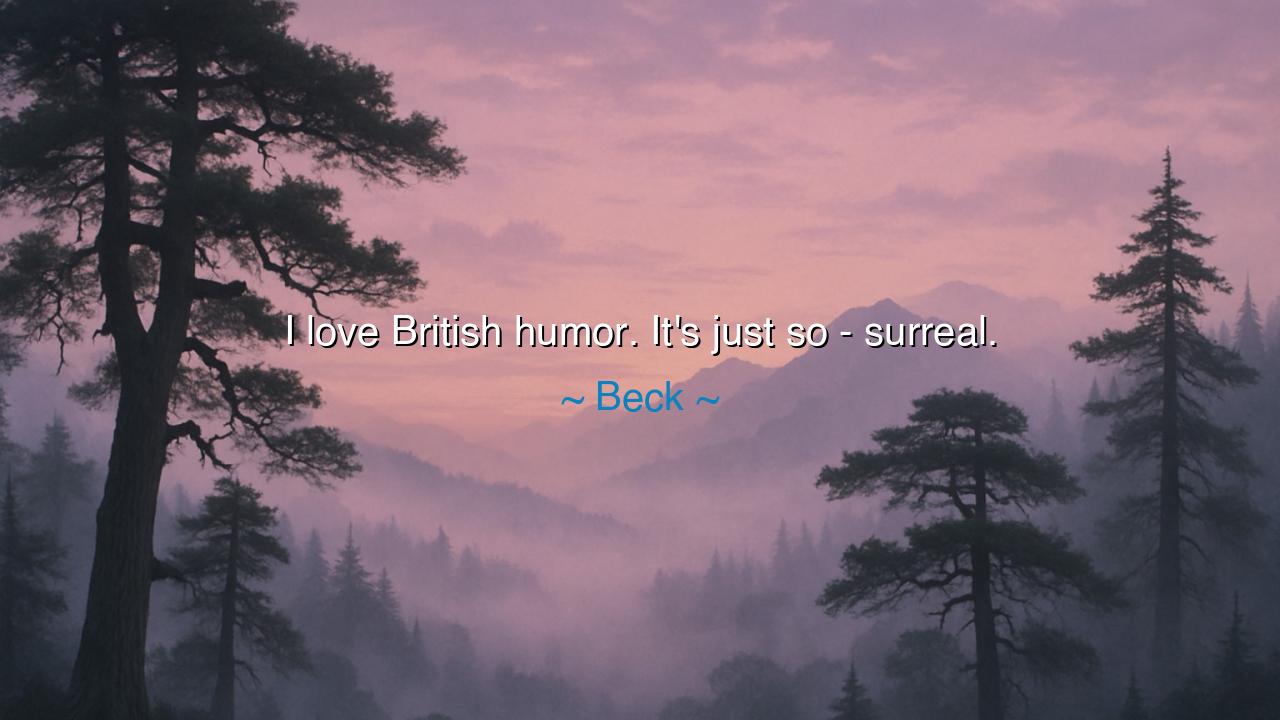
I love British humor. It's just so - surreal.






Hear the words of Beck, the poet of the modern age and wanderer between sounds and symbols: “I love British humor. It’s just so—surreal.” In these few words, he captures a truth about laughter that transcends borders, a truth that the ancients themselves might have recognized: that humor, when it ascends to its highest form, becomes not merely entertainment, but philosophy—an art of seeing the world through different eyes. Beck, a man whose music dances between irony and sincerity, between absurdity and beauty, speaks here not only of a style of comedy, but of a worldview—a way of embracing the strange and finding truth within the impossible.
To say that British humor is surreal is to acknowledge that it is born from paradox. It takes what is ordinary and renders it extraordinary; it finds meaning in nonsense and laughter in despair. It is humor that lives in the twilight between reason and chaos, between tea and madness. The British, whose history has known empire and ruin, order and rebellion, have learned to face the absurdities of life not with complaint, but with wit. Their laughter is not the laughter of denial—it is the laughter of endurance, of those who can look at the crumbling wall and remark, “Well, at least it’s symmetrical.”
The ancients would have known such laughter. Diogenes the Cynic, who lived in a barrel and mocked the powerful with biting irony, embodied the same spirit. When Alexander the Great offered to grant him any wish, Diogenes merely replied, “Stand out of my sunlight.” The crowd laughed, but beneath that laughter was revelation—the truth that pride and power mean nothing before the freedom of the soul. So too in British humor, the absurd hides the profound. From the dry wit of Oscar Wilde to the delightful madness of Monty Python, the British have mastered the art of disguising philosophy as foolishness. Their comedy teaches not by preaching, but by unsettling the mind, forcing us to question what we take for granted.
When Beck calls this humor surreal, he speaks as an artist who recognizes kinship. Surrealism, that movement of the dreamers and visionaries, is the art of revealing truth through the impossible. It is the laughter that arises when logic breaks, when the world bends and shows its hidden face. Just as Salvador Dalí painted melting clocks to show that time is fragile, the surrealist humorist tells impossible jokes to remind us that reality is not as stable as we imagine. British humor, with its absurd characters, dry delivery, and embrace of contradiction, is surreal because it mirrors life itself—an endless riddle that can only be survived through laughter.
Consider Winston Churchill, who faced the darkness of war with courage and wit. When told that Britain’s situation was dire and surrender might be prudent, he replied, “If you’re going through hell—keep going.” Beneath the humor lay defiance, the same defiance found in the surreal. To laugh in the face of the incomprehensible is to declare mastery over it. The British, surrounded by fog, rain, and the unpredictable tides of history, have long learned that humor is their lantern in the storm. Beck, who has lived through the chaos of art and fame, recognizes this lantern and loves its glow.
The origin of his admiration lies not merely in cultural difference, but in a shared artistic vision. Beck himself is a musician of paradox—his songs weave irony and earnestness, joy and melancholy. Like the British humor he admires, his art finds beauty in confusion. To call something surreal is to say that it touches the subconscious—that it makes us laugh while also stirring something deeper, something wordless and true. When Beck laughs at the absurdity of British humor, he is not laughing at nonsense, but through it. He sees in it the same power that art possesses: to reveal truth through distortion, to find harmony in dissonance.
Let this be the teaching passed down to all who seek wisdom in laughter: embrace the surreal, for it will keep your soul alive in a world too fond of order. Do not fear the strange or the absurd; they are the gateways to understanding. Laugh not only at what is simple, but at what is mysterious. For in the surreal—in the contradiction, in the dream, in the unexplainable—lies the secret of endurance. Beck’s love for British humor is, at its heart, love for the human spirit’s ability to find joy in chaos, to transform confusion into art, and to greet life’s madness with a wry smile instead of despair.
So remember this: the next time life confounds you, when reason fails and the world seems too absurd to bear—laugh. Laugh deeply, laugh strangely, laugh with the freedom of one who has seen through illusion. As the surrealists and the sages both knew, humor is not the opposite of wisdom, but its twin. And in the laughter of the surreal, as Beck reminds us, we find not escape from reality, but a deeper communion with its wondrous, bewildering truth.






AAdministratorAdministrator
Welcome, honored guests. Please leave a comment, we will respond soon